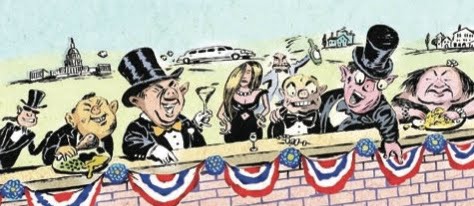On November 2, 2010, the liberals suffered a defeat at the hands of the people over their policies implemented over the last two to four years. As a result, Many Republicans and Tea Party supporters are jubilant in their celebration, and even the often morose Glenn Beck has been heard to be excited about what he calls a turning point. However, the cold, hard reality is that liberalism suffered a defeat but not a crushing one, and the war is far from won. In the past, victories in these minor skirmishes have resulted in people becoming complacent. The battles that are not making the headlines in the war on freedom continue to rage despite the victory.
National Review
There is, we like to think, solid reason for rejoicing. Prodigious efforts, by many people, are responsible for NATIONAL REVIEW. But since it will be the policy of this magazine to reject the hypodermic approach to world affairs, we may as well start out at once, and admit that the joy is not unconfined.
Let’s face it: Unlike Vienna, it seems altogether possible that did NATIONAL REVIEW not exist, no one would have invented it. The launching of a conservative weekly journal of opinion in a country widely assumed to be a bastion of conservatism at first glance looks like a work of supererogation, rather like publishing a royalist weekly within the walls of Buckingham Palace. It is not that, of course; if NATIONAL REVIEW is superfluous, it is so for very different reasons: It stands athwart history, yelling Stop, at a time when no one is inclined to do so, or to have much patience with those who so urge it.
“The Report of our Death was Greatly Exaggerated.”
So whatever happened to the death of conservatism? Wasn’t it supposed to be long gone by now, crumbling within its sarcophagus, a dim memory of a discredited past? Didn’t we start hearing authoritative rumblings about its impending doom around the time of the last set of midterm elections, in 2006, when disillusioned ex-conservatives like Francis Fukuyama and soi-disant types like Andrew Sullivan began tuning their cellos of lamentation and discontent? Wasn’t that also approximately when disaffected conservative writers were proclaiming, in the pages of the Washington Monthly, that “It’s Time for Us to Go”? The talk was so deafening that I was moved to argue with it back in January 2007 in these pages in an article entitled “Is Conservatism Finished?” I concluded with some gingerness that it was not, but my conclusion came nearly two years before the most liberal candidate to run for the presidency in nearly half a century won a resounding victory.
FrontPageMag.com
David Horowitz was one of the founders of the New Left in the 1960s and an editor of its largest magazine, Ramparts. He is the author, with Peter Collier, of three best selling dynastic biographies: The Rockefellers: An American Dynasty (1976); The Kennedys: An American Dream (1984); and The Fords: An American Epic (1987). Looking back in anger at their days in the New Left, he and Collier wrote Destructive Generation (1989), a chronicle of their second thoughts about the 60s that has been compared to Whittaker Chambers’ Witness and other classic works documenting a break from totalitarianism. Horowitz examined this subject more closely in Radical Son (1996), a memoir tracing his odyssey from “red-diaper baby” to conservative activist that George Gilder described as “the first great autobiography of his generation.”
Townhall.com
Your Source for Conservative News, Cartoons, Issues, Blogs & Magazine…
The Weekly Standard
The Weekly Standard made its debut on September 18, 1995. Edited by William Kristol and Fred Barnes, the magazine is published 48 times a year by Clarity Media Group. The Weekly Standard is available by subscription.
Solving the Obama Problem
Regular readers of this site need not be reminded of Barack Obama’s countless gaffes, aberrations, indulgences, prevarications, poor decisions, shady dealings and worrisome patches of biographical obscurity. These blemishes have been rehearsed in article after article to the extent to which we can say that, by this time, the issue of his competence and bona fides should have reached critical mass. Nevertheless, for the fence sitters, the undecideds or those of a different political persuasion who out of curiosity occasionally scan the conservative media, it might be expedient to revisit the Obama problem and set down a brief summary of the president’s track record.
Ayn Rand
Ayn Rand was born in St. Petersburg, Russia, on February 2, 1905. At age six she taught herself to read and two years later discovered her first fictional hero in a French magazine for children, thus capturing the heroic vision which sustained her throughout her life. At the age of nine, she decided to make fiction writing her career. Thoroughly opposed to the mysticism and collectivism of Russian culture, she thought of herself as a European writer, especially after encountering Victor Hugo, the writer she most admired.
America’s Ruling Class — And the Perils of Revolution
As over-leveraged investment houses began to fail in September 2008, the leaders of the Republican and Democratic parties, of major corporations, and opinion leaders stretching from the National Review magazine (and the Wall Street Journal) on the right to the Nation magazine on the left, agreed that spending some $700 billion to buy the investors’ “toxic assets” was the only alternative to the U.S. economy’s “systemic collapse.” In this, President George W. Bush and his would-be Republican successor John McCain agreed with the Democratic candidate, Barack Obama.






